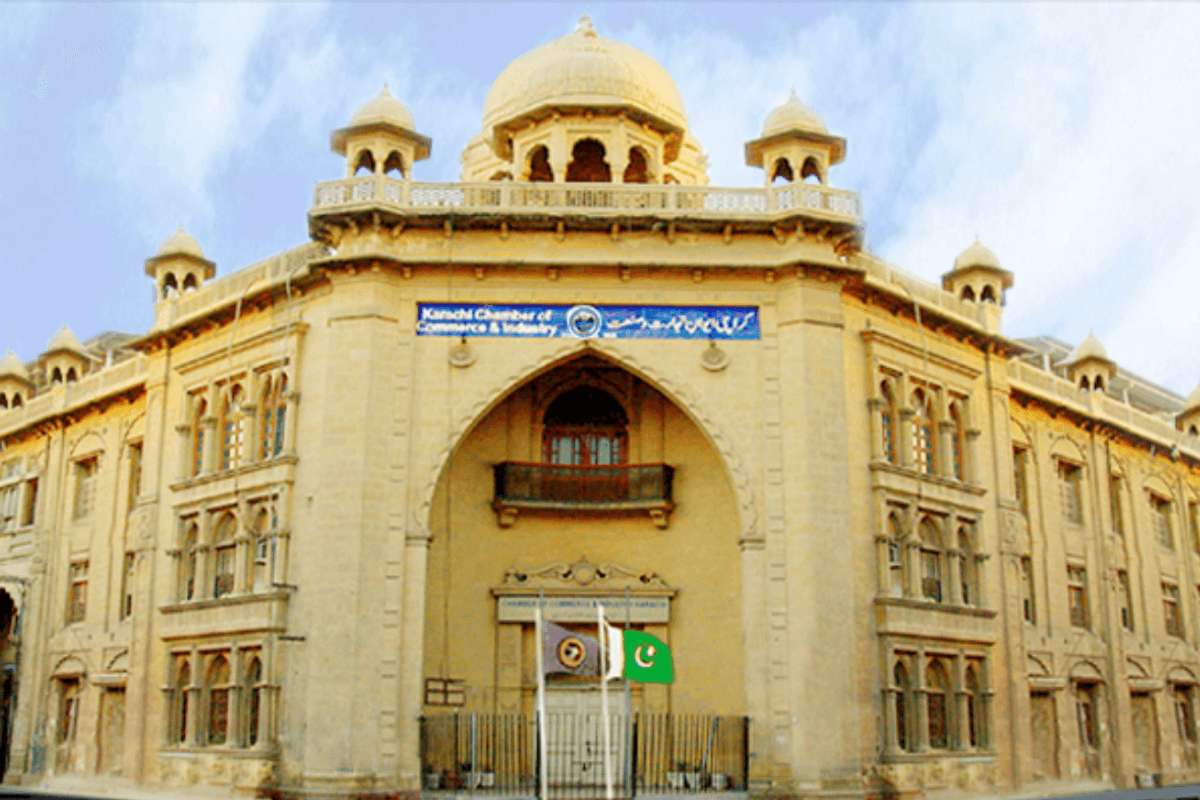Lawmakers, traders mull district business chambers in Karachi
National Committee directs officials to prepare summary for separate chambers for each district of city
Business Desk
The Business Desk tracks economic trends, market movements, and business developments, offering analysis of both local and global financial news.

Karachi Chamber of Commerce and Industry building.
KCCI
Karachi, the biggest city of Pakistan, might get separate chambers of commerce for each of its seven administrative districts, as the country’s parliamentary committee has sought a plan to divide the metropolis’ business bodies.
The National Assembly’s Standing Committee on Commerce directed the Directorate General of Trade Organizations (DGTO) to prepare a summary for federal cabinet approval. The directive came during a meeting of the committee, chaired by lawmaker Javed Hanif, where the longstanding demand for independent chambers in each of Karachi’s districts was discussed at length.
“Prepare a summary which we will send to the federal cabinet for approval,” said Hanif, signaling political willingness to consider decentralizing Karachi’s commercial representation.
Background and Debate
The proposal has stirred a mix of support and concern among business leaders, analysts, and government officials.
CEO of the Trade Development Authority of Pakistan (TDAP), Zubair Motiwala, opposed the idea, emphasizing that Karachi, despite being a large metropolitan area, should maintain a single chamber.
“Karachi has had a robust and unified chamber since 1959. Even large cities worldwide have only one chamber of commerce,” Motiwala argued. “If we split Karachi into multiple chambers, which of them will foreign partners sign sister city agreements with?”
He also questioned the practicality of town-based chambers in a globally integrated city like Karachi, adding, “This will fragment our trade diplomacy.”
Support for District-Based Chambers
DG Trade Organizations informed the committee that Karachi’s existing chamber license was renewed in 2024 with the condition of an upgraded charter. From 2007 to 2011, Karachi was treated administratively as a single district, further complicating the push for district-based chambers.
However, not all lawmakers agreed.
Mirza Ikhtiar Baig, a committee member and businessman, highlighted that Pakistani law allows the formation of chambers in all districts.
“If other districts in the country can have their own chambers, then why not Karachi’s districts?” Baig said. “If that’s not feasible, then the law should be amended to make an exception for Karachi.”
Committee member Gul Asghar Khan supported the idea, noting, “Each district has different economic challenges. Karachi is no different.”
Skepticism from Traders and Analysts
Despite political backing from some quarters, market analysts and traders expressed concerns about the move.
“This could create infighting among business groups and dilute Karachi’s collective voice in national policy discussions,” said an analyst. “Splitting the chamber may serve local interests but will harm the city’s bargaining power in Islamabad.”
A senior trader in Saddar, who requested anonymity, echoed the sentiment: “This feels more political than economic. Businesses need unity, not division.”
Asad Alam Niazi, another committee member, warned, “If each district forms its own chamber, they will likely end up in constant conflict. There’s no urgent need for more chambers in Karachi at this point.”
Way Forward
Despite the divide, the committee instructed the DGTO to draft a proposal for creating district-specific entities, although the final structure—whether full chambers or sub-offices—remains open for interpretation.
“Karachi Chamber will continue to represent the entire city,” Chairman Hanif clarified. “But additional district-level bodies can be named differently to avoid overlap.”
The committee also suggested avoiding the use of the word “chamber” for these new bodies, a position reinforced by Motiwala to prevent confusion on international platforms.
The summary is expected to be submitted to the federal cabinet in the coming weeks for final approval.






Comments
See what people are discussing